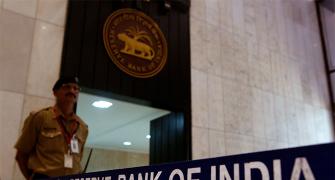While US indices slid 3%, FTSE, DAX and CAC were down 6%, 5% and 3%, respectively. Nifty and Sensex, slid 1.4% and 0.8%
Illustration: Uttam Ghosh/Rediff.com

For years now, India equities have marched in lockstep with global equities.
If we go back a decade, our benchmark indices slumped in sync with other global indices in the aftermath of the Lehman Brothers collapse.
Then again, they rallied with other global indices when a stimulus package was announced in the US in 2009.
The fall in the past week, too, was in line with global equities. What's surprising, however, was that the slide was not to the extent expected.
"While we are not quite delinked, India will be much less impacted by what happens to US interest rates", said UR Bhat, managing director, Dalton Capital Advisors (India).
"Our exports basket is well diversified and unlike some of the other emerging markets such as Taiwan, Thailand, and China we are not as dependent on US borrowings."
In the year to date, the US indices have slid 3 per cent on inflation threat and concerns that the US Federal Reserve would move aggressively to raise interest rates.
The UK's FTSE, Germany's DAX and France's CAC are down 6 per cent, 5 per cent and 3 per cent, respectively.
Our benchmarks Nifty and Sensex, on the other hand, have slid 1.4 per cent and 0.8 per cent in dollar terms, respectively.
Emerging markets that depend on commodity exports have also been largely insulated from the global rout.
The sliding dollar and hopes of a further boost to the global economy have driven commodity prices higher.
Brazil's Ibovespa, for instance, is up more than 7 per cent in the year to date. Thailand and Indonesia are up 4.2 per cent and 2 per cent, respectively.
According to Andrew Holland, chief executive officer, Avendus Capital Alternate Strategies, domestic flows have become a lot more resilient this time around compared with, say, 2008.
"Domestic flows have been robust; that's what has kept the markets from going into free fall," he said.
Foreign portfolio investors (FPIs) have historically been the dominant player in Indian equities, given their size and trading patterns.
However, that has changed in the past couple of years with domestic institutional investors (DIIs), particularly mutual funds (MFs), stepping up purchases, and giving much needed support to the markets.
The financialisation of savings, triggered by demonetisation, has also supported this trend.
The rise in the share of domestic investors reduces dependence on the more volatile foreign inflow.
In the past two calendar years, equity schemes have seen monthly inflows of Rs 4,000-6,000 crore via systematic investment plans (SIPs). MFs have pumped Rs 1.6 trillion into Indian equities over the period, more than twice the Rs 71,400 crore put in by FPIs.
Despite the slip-up on the fiscal front, India is currently on a better wicket than most other emerging markets.
"Most of the emerging markets are grappling with political or currency issues, or have lost growth momentum.
"Our political environment remains stable, and our currency and fisc are in reasonably good shape," said Bhat.
There's likely to be an improvement in earnings growth with the impact of demonetisation and GST fading away.
"We expect FY19 earnings to benefit from underlying consumption recovery, a low base of FY18 and impending resolution of NPAs via Insolvency and NCLT mechanism.
"To that extent, the gradual pick-up in high-frequency indicators such as credit growth appears encouraging," said Motilal Oswal analyst Gautam Duggad.
Sectors such as materials, auto, energy and industrials have done well in the December quarter, said experts.
The GDP growth numbers, in the aftermath of the twin blows of demonetisation and GST, have held up well.
All this may offer to encourage overseas investors who have remained on the sidelines for more than a year to enter.
"The earnings for the December quarter has not been all that bad. Stocks have corrected and there's some value now for overseas investors to enter the market now," said Holland.
"It's not a 2008-like situation as global economies are on the mend, with both the US and Europe recovering," added Bhat.
"For India, better compliance on the GST front, proceeds from disinvestment, resolution of the banks' NPA (non-performing assets) issue and the push for rural growth are positives."










